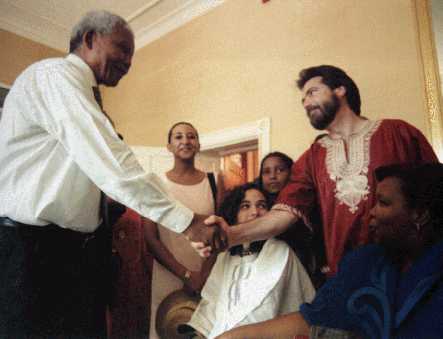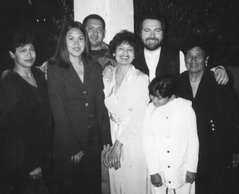 Interview with Manissa
Interview with ManissaIn 1914 an interview between Judith Cuthbert and an 89 year old free slave Manissa appeared in the
Manissa was born in 1824 on the farm
Manissa, described as ‘a poor little bundle of living merchandise’ was sold together with her family at a public auction to Johannes Haupt who farmed at Moddergat. When slavery came to an end after the 4 year apprenticeship she was 14 and her owners were paid compensation of 75 pounds.
While the interview is more lengthy this is a few of her words describing some of what she had witnessed and been through:
No, the slave days were not good. Women were put in the stocks and were also punished by having heavy leather ear-pads, just like the blinkers used for horses, tied over their ears. Ach! the whipping tree was awful; whether it was the father, mother, sister or brother or child, you had to help tie them up. The body was bare and they would be beaten until they leapt in the air, and the blood spurted out.
After the slaves were freed, the apprentice system came in, and you were then sent with a note to the nearest landdrost, who was supposed to hear both sides, but most of us found they thrashed us there without bothering to hear if we were in the right or the wrong, and then we had to make up our work when we got back to the farm; so we rather let the master whip us and say nothing about it; only after a bit we would hire ourselves to a good baas; and that's where it was good to be free.
We were not allowed to get married, but a male slave would ask permission from his owner and from the woman's master if he could take her, and he then slept at the woman's place without being afraid of being shot. The children of such a union always became the property of the woman's master. Females were supplied with a one-piece garment three times a year, made of quilted gingham, very like bed ticking, and the men with a jacket and trousers of leather twice a year. The smart boys used to get us to wash their leather suits with yellow sorrel blossom to make them a yellow colour.
The food was very scarce, mostly soup made from either beans, mealies, potato or pumpkin. Now and again an offal (sheep's head, tripe and trotters) was given, and had to be divided between seven. A trotter and a bit of pens (tripe) and two ladles of broth for four, and the head and remaining broth for the other three. At Moddergat we didn't really suffer much from want of food, but many of us first had to steal to keep body and soul together.
(Quotation: Echoes of Slavery; Ch12:p140 - Jackie Loos, Pub:David Philip)


1 comment:
As a researcher of Forgotten Histories of Slavery in the Cape I would appreciate access to more similar hidden histories.
Kindly reply with any further history of the freed slave Samiesa and her life such as it may be available.
THANK YOU
RICHARD MOLLAT
0786289037
Post a Comment